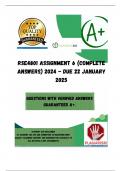,RSE4801 Assignment 6 (COMPLETE ANSWERS) 2024 -
DUE 22 January 2025; 100% TRUSTED Complete, trusted
solutions and explanations.
Based on what you have learnt in Unit 1 of the Module, and the
Module in general, write an essay in which you reflect on what
you think it takes to become an internationally acclaimed and
respected educational researcher. (1200 – 1600 words)
Becoming an Internationally Acclaimed and Respected
Educational Researcher: A Reflective Essay
Educational research is a dynamic and multifaceted field that
seeks to advance understanding and improve practices in
education globally. Over time, the role of an educational
researcher has evolved, driven by the need to address complex
challenges within classrooms, educational policies, systems, and
the broader socio-cultural contexts in which education is
embedded. The pursuit of becoming an internationally
acclaimed and respected educational researcher is one that
demands a deep commitment to rigorous research, ethical
responsibility, and a profound understanding of both the theory
and practice of education.
Drawing from the insights gained in Unit 1 of the module,
alongside broader reflections on the entire module, this essay
explores the qualities, skills, and strategies that contribute to
becoming a successful and respected educational researcher in
an international context. It will discuss the importance of a solid
research foundation, an interdisciplinary approach, critical
engagement with global and local issues, and the ability to
disseminate findings effectively. Additionally, it will address the
, role of networking, collaboration, and professional integrity in
building a successful academic career in educational research.
1. The Foundation of Rigorous Research Practice
To become an internationally recognized educational researcher,
the first and most essential step is to develop a foundation of
rigorous research practices. Rigorous research involves the
application of systematic, objective, and transparent methods to
answer research questions and solve educational problems. This
commitment to rigor is fundamental not only to producing high-
quality findings but also to earning the trust and respect of the
academic community and beyond.
One of the primary characteristics of strong educational research
is methodological expertise. An internationally respected
educational researcher must be proficient in a variety of research
methodologies—both qualitative and quantitative—that are most
suited to the research questions being posed. A clear
understanding of different research paradigms, such as
interpretivism, positivism, and critical theory, and the ability to
apply them appropriately to different educational contexts, is
crucial.
Furthermore, a sound knowledge of ethical considerations in
educational research is indispensable. This includes ensuring
informed consent, maintaining confidentiality, and being
sensitive to issues such as power dynamics, equity, and social
justice. Ethical research not only upholds the dignity and rights
of participants but also reinforces the credibility and legitimacy
of the researcher’s work. Rigorous attention to these ethical





